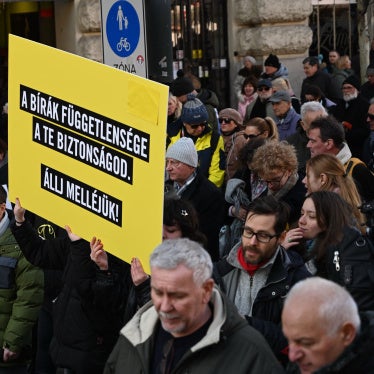Russia's conduct in Chechnya stands in the way of full integration into Western institutions, Human Rights Watch said today. In letters to NATO and the European Union, which are holding summits with Russia on May 28, Human Rights Watch said that the Russian military's record of abuse in Chechnya undermines the core values and strategic goals of both institutions
The NATO summit is expected to create the NATO-Russia Council, which would put Russia on equal footing with other member states on key decisions.
"Russia now is getting a shot at equal partnership in NATO, even though its armed forces are notorious for human rights violations in Chechnya," said Elizabeth Andersen, executive director of Human Rights Watch's Europe and Central Asia division. "Yet NATO has a commitment to promote rule of law and stand firm against human rights violations."
The human rights situation in Chechnya has deteriorated in the past six months. Federal forces continue to detain without charge hundreds of people suspected of involvement in rebel activities. Many are tortured or killed. Some "disappear"-authorities deny that detained individuals are in custody. In the early phase of the war, more than 130 people were killed in three massacres that authorities have not properly investigated.
NATO has required states seeking membership to abide by the principles of civilian control of the military and accountability for abuses of the laws of war. Croatia was not allowed to joint NATO's Partnership for Peace program until it started holding accountable members of its armed forces implicated in war crimes. By contrast, Russian authorities have formally opened hundreds of criminal investigations, but for the most part violations of human rights and international humanitarian law remain uninvestigated and unpunished. Moreover, there is credible evidence that the military obstructs some investigations, notably by transferring accused personnel to avoid having them questioned.
In September 2001, Russian authorities said that eleven servicemen had been convicted for crimes committed in Chechnya. Of the eleven, six had either been amnestied or paroled, and five were serving active sentences-one for looting, two for murder, one for attempted murder, and one for mishandling a weapon. By March, military courts had convicted twenty-three military servicemen, although case details are unavailable.
"If NATO addresses directly the Russian military's abusive methods and the lack of accountability, it can contribute to positive change," said Andersen. "But if NATO is silent, then it's Russia that will have changed NATO."
Human Rights Watch asked the E.U. to speak out strongly about Chechnya at the summit this week. In April, the E.U. sponsored a resolution on Chechnya at the U.N. Commission on Human Rights that condemned abuses and called for U.N. investigations. The commission voted down the resolution, 16-15.
"This is the first time Russia succeeded in defeating a U.N. resolution on Chechnya," said Andersen. "The Russian government and people should know that the stand the E.U. took at the commission remains an important element its relationship with Russia."
Human Rights Watch asked NATO and the E.U. to:
Press for an updated, detailed list of criminal investigations into violations by police, military, and other security forces against noncombatants in Chechnya;
Urge Russia to issue invitations to Chechnya to all relevant U.N. human rights mechanisms, as required by past UNCHR resolutions on Chechnya;
Press for the renewal of the mandate of the Organization for Security and Cooperation in Europe Assistance Group to Chechnya.
Human Rights Watch also asked NATO and its members to conduct an inventory of their contacts with Russian military, police and other security units to ensure there is no direct cooperation with units or officers complicit in violations of the laws of war in Chechnya.







